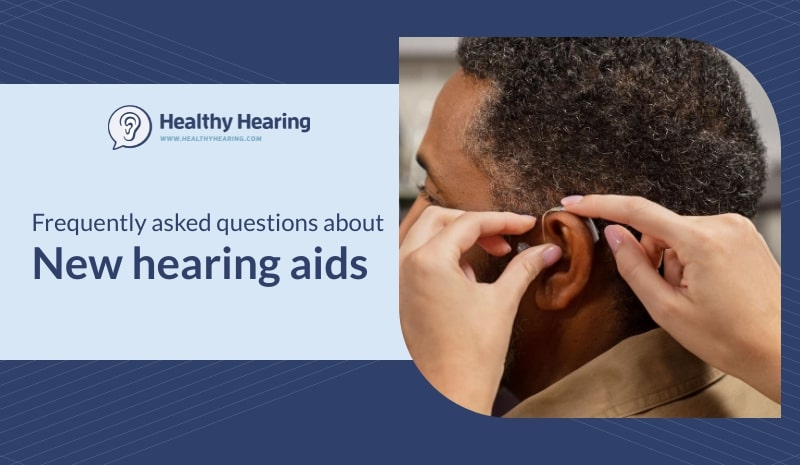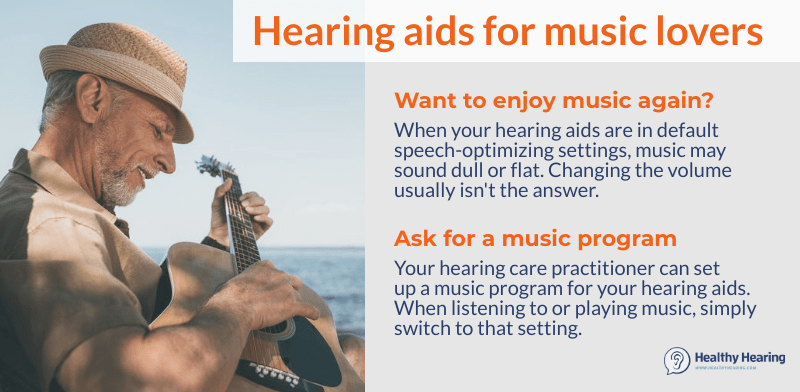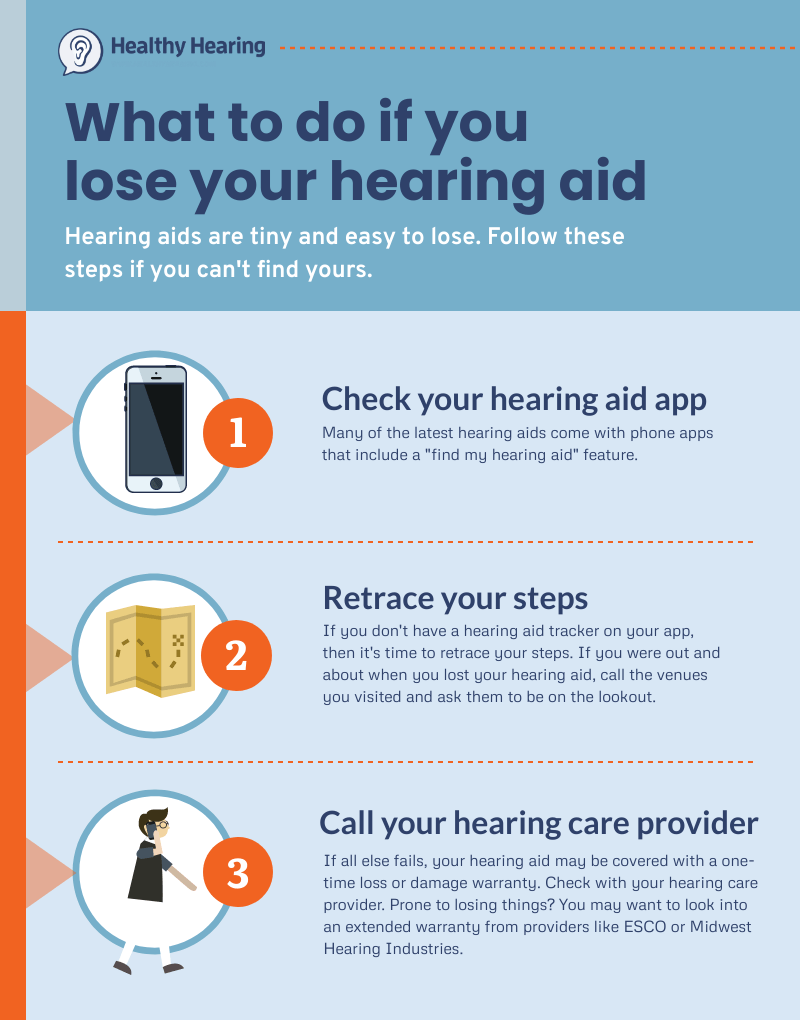|
www.HealthyHearing.com |
New hearing aids? FAQs for (nearly) all you need to know
Contributed by Joy Victory, managing editor, Healthy Hearing Even though hearing loss is common among Americans, hearing aids still remain somewhat of a mystery to many of us. You may know someone who uses hearing aids, but you probably couldn't explain what type they have—let alone the brand they wear! So, if you find yourself with new hearing aids and feel a bit lost, that's normal. Here at Healthy Hearing, we've written hundreds of articles on hearing loss and hearing aids, and while we'd love if you read every single one of them, this FAQ is meant to distill our content down to the basics and help you make sense of your new hearing aids.
First, what are hearing aids?Hearing aids are small electronic devices that fit around or in your ear. In very basic terms, they come in three parts: A microphone that picks up the sound around you, a processor that amplifies the sound to precise levels for your unique hearing loss, and a speaker that delivers that sound into your ear. Want to learn more? Here's a detailed look at the parts of a hearing aid. I'll get used to my new hearing aids right away...right?Hearing aid adjustment periodFor some people, yes. But for most people—especially if you had untreated hearing loss for a long time—it will take some time to adapt. That's because your brain has to get used to all the new sounds it had forgotten due to auditory deprivation (including how your own voice sounds at full amplification). Unlike new eyeglasses that may only take a few minutes to get used to, hearing aids have a longer "getting acquainted" period. During their first hearing aid experience, most people receive instructions from their hearing care provider on how to get used to their hearing aids; for example, working up from wearing them for a few hours a day to all day. Be patient, and follow your hearing professional's guidance for when/where to wear them. If you're still struggling to get used to yours after a few weeks, contact your hearing care provider. We can't say it enough: Don't give up! Here's 7 tips for getting used to your new hearing aids. And if you're feeling like you straight-up hate your hearing aids, well, we've got advice for you, too. Are there any side effects of wearing hearing aids?It's not unsual to get a headache from wearing new hearing aids, but the effect is temporary. Expect your hearing aids to be comfortable. You should know they are there, but you should never experience ear pain, soreness, bleeding or skin irritation. If any of these occur, remove the hearing aids immediately and see your hearing care professional for an adjustment in fit. Your hearing care provider also can help with itchy ears, which hearing aids can sometimes cause but is easily treated. Expect to be able to hear soft sounds once again and to be able to hear louder sounds comfortably. See a hearing care professional, however, if “normal loud” sounds, such as the roar of a car engine or a door slamming, are painful. Will I have perfect hearing?Don’t expect perfection. Hearing aids are not a “cure all," but are simply one tool to help you hear better. They are not a perfect replacement for normally-functioning ears. Although today’s hearing aids are miles above where they used to be, you might still have trouble hearing in certain situations, such as a noisy restaurant or at a party with a lot of background noise. Keep in mind that even people with very good hearing also still have trouble catching every word of a conversation in these environments. What about after I get used to them?Once you get used to your hearing aids, it's important to wear them as much as you possibly can (except for activities like sleeping, showering or swimming, unless you got waterproof hearing aids). Otherwise you'll just prolong or restart your adjustment period, to the point you may never quite get used to them. Also, it's just plain good for your brain to have the full stimulation of your environment. While our society tends to dismiss hearing loss as normal, it's bad for your brain, especially over time. How much maintenance are they going to need?Hearing aids contain expensive computer chips and other microelectronics—you want to do your best to take care of them so they last a long time. They need regular cleaning and may need occasional servicing from your hearing care provider. In general:
There are a plethora of hearing aid accessories that can help you protect your hearing aids. Do all hearing aids look the same as mine?No, hearing aids come in many types and styles, including over-the-counter. The most common style is one that sits behind the ear, but there are also completely in-the-ear styles that are so tiny they're nearly invisible. Some come with disposable batteries and some come with rechargeable batteries. The kind you wear depends on the type of hearing loss you have, your budget and your personal preferences. I think something is wrong with my hearing aid.First, check out our troubleshooting guide. Many hearing aid issues have simple fixes, such as cleaning out earwax. If neither of those things help, contact your hearing care provider. My hearing aids aren't playing well with my eyeglasses. What do I do?You're in luck: We've got an article on wearing hearing aids and eyeglasses. Bottom line: It may take a bit of adjustment, but wearing hearing aids and eyeglasses together should not be uncomfortable. Ack! My hearing aids just whistled. What's going on?That's probably hearing aid feedback, which can happen if the speaker gets to close to the microphone. Expect whistling (feedback) as you put your hearing aids in unless you turn them off while inserting. Here's why hearing aid feedback happens and what to do about it. I love music. But it doesn't sound right. Why?Hearing aids are programmed to process sound in quiet environments, especially human speech. If you're a music lover, ask your hearing care provider for a custom music setting and you'll find music much more pleasant. You can also set up other custom hearing aid settings, such as for driving or working.
I have tinnitus. Will my hearing aids help or make it worse?Hopefully this is something you covered with your hearing care provider. Many new hearing aids come with tinnitus masking capabilities. Even without any fancy features, hearing aids often help people who have both hearing loss and tinnitus because hearing aids amplify the the sounds they want to hear while minimizing the sound they don't (the ringing in their ears). That said, medical experts are still not sure how or why tinnitus occurs, so you may need a multi-step treatment plan for your tinnitus, of which hearing aids play a big part. How long will my hearing aids last?Most people wear one pair of hearing aids about five years before they get a new pair. Hearing aids endure a lot of wear and tear, even if your most robust hobby is pulling weeds. New technology, including artificial intelligence, also makes upgrading irresistible for a lot of reasons, especially their capability to work in tandem with smartphones. Speaking of, did your hearing aids come with a phone app? If so, we highly recommend spending some time checking out your hearing aid's app, as they can track a lot of neat things for you. You might also want to check out some fun hearing exercises and games that can help you train your brain to hear better. What if my hearing loss gets worse?For most people, hearing loss gets progressively worse over time. That's why it's important to see your hearing care provider regularly. She or he can give you a hearing test and update your hearing aids to reflect the changes in your hearing. If your hearing loss has progressed to severe or profound, your provider may recommend a superpower hearing aid or a cochlear implant. To slow the rate of hearing loss, be sure to protect your residual hearing. I think I lost my hearing aid! What should I do?This is more common than you might think, which is why we have these tips for what to do if you lose a hearing aid.
What about warranties?Most hearing aids come with a basic warranty, which you should discuss with your hearing care provider. Additionally, purchasing an extended hearing aid warranty is a good idea, too. Are they deductible?Great question! With a great answer: Yes, hearing aids are considered a deductible medical expense. What should I do with my old pair of hearing aids?You've got options besides holding on to them. Find out what experts recommend for hearing aids you don't need anymore. This was great. Do you have a newsletter?We're so glad you asked! If you're new to the world of hearing aids, you may want to sign up for our monthly newsletter, curated by our managing editor. You'll get our latest articles on hearing loss, tinnitus, and hearing aids—helping you make the most of your new hearing aids and learning more about how hearing loss and tinnitus affect your health and quality of life. And please contact us if you've got a new hearing aid concern we're not addressing here. Happy hearing! Joy Victory, managing editor, Healthy Hearing
Related Help Pages:
Hearing aids Types of hearing aids Technology Bluetooth Fitting Cleaning Repairs Batteries Accessories
|
Featured clinics near me
Earzlink Hearing Care - Reynoldsburg
7668 Slate Ridge Blvd
Reynoldsburg, OH 43068

Find a clinic
Need a hearing test but not sure which clinic to choose?
Call 1-877-872-7165 for help setting up a hearing test appointment.





 Joy Victory has extensive experience editing consumer health information. Her training in particular has focused on how to best communicate evidence-based medical guidelines and clinical trial results to the public. She strives to make health content accurate, accessible and engaging to the public.
Joy Victory has extensive experience editing consumer health information. Her training in particular has focused on how to best communicate evidence-based medical guidelines and clinical trial results to the public. She strives to make health content accurate, accessible and engaging to the public.